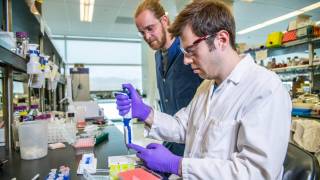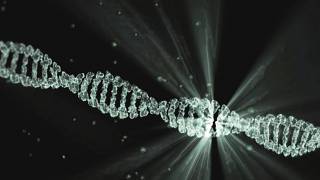Cornell Researchers Found ‘What’ Switches Herpesviruses On

Most herpes simplex virus 1 (HSV-1) vaccine researchers have focused on ‘when and how’ individual genes on the herpes virus genome are turned on and off during an outbreak.
Cornell University researchers hoping to learn ‘what’ switches this life-long virus between latent and lytic stages, may have found the ‘hidden’ answer to this question.
This is important news since most sexually-active people carry herpesviruses, but may not know it.
In the new study published on November 14, 2019, a group of scientists from Cornell’s Baker Institute for Animal Health, with scientists from the University of Alberta and the University College London, showed that ‘the dynamics of the chromatin regulate whether the entire herpesvirus genome is turned on.’
They believe ‘that chromatin dynamics modulate the transcriptional competence of the HSV-1 genome.’
Furthermore, ‘genes in genomes rendered transcriptionally inactive by chromatin dynamics cannot be transcribed.’
‘Whereas transcription of individual genes, or of a group of genes, is regulated separately in the transcriptionally competent genomes.’
> Confidential/Private Herpes Test <
This new mechanism represents a previously overlooked way to regulate gene expression at the level of the entire viral chromosome.
With this new knowledge, ‘researchers can further explore the interplay between the virus and host cells that determines whether viral DNA is expressed,’ said these researchers.
Herpes’ ability to ‘lay low’ in nerve cells has thwarted efforts to create effective vaccines or antiviral drugs that fully prevent or cure the infection.
Antiviral drugs to treat herpes have existed since the 1960s, but thus far a cure or an effective vaccine has been out of reach.
“Latency and gene regulation is a big problem because we do not know nearly enough about it,” said Luis M. Schang, MV, Ph.D.
“It’s a big black box in herpes biology.”
The discovery opens up new directions for exploring how the virus reactivates after lying dormant.
“Any problem that herpes causes are because of reactivation from latency,” Dr. Schang said.
“That’s the reason why antivirals cannot cure the infection and why so far it’s been impossible to develop a vaccine. Latency and reactivation are a major focus for herpes virus research.”
When the herpes virus enters a cell, the cell tries to protect itself by wrapping the viral DNA tightly around spool-like proteins called histones and condensing it into chromatin, which causes the virus to go dormant.
But, if the cells are unsuccessful, the chromatin is only loosely bundled, leaving the viral DNA accessible.
The virus particles can then turn on their genes and replicate using the cell’s machinery to start a lytic infection, causing disease.
Infections from the herpes virus cause cold sores and genital sores, as well as life-threatening infections in newborns, encephalitis and corneal blindness, says the Centers for Disease Control and Prevention (CDC), as of November 21, 2019.
It is important to know that you can also get herpes from an infected sex partner who does not have a visible sore or who may not know that he or she is infected, because the virus can be released through your skin and spread the infection to your sex partner.
Recent herpes vaccine news
- October 28, 2019 – Arizona researchers announced they have discovered a function in a pro-inflammatory protein that could play an important part in improving therapeutics for herpesviruses.
- September 20, 2019 – A HSV2 vaccine study reported an experimental vaccine developed at the University of Pennsylvania has prevented genital lesions in 98 percent of mice and guinea pigs tested.
Several clinical trials have tested vaccine candidates against genital herpes infection, but there is currently no commercially available vaccine that is protective against genital herpes infection.
Previously, the herpes simplex virus 2 (HSV-2) HSV529 vaccine candidate was found safe and elicited neutralizing antibody and modest CD4+ T-cell responses in 60 HSV-seronegative adult male/female vaccinees
This is good news because HSV-2 causes genital herpes in over 400 million persons worldwide and there is not an HSV-2 vaccine commercially available today.
Support for this new work was funded by CIHR Operating Grants MOP106452 and 301689, start-up funds by The Baker Institute and Cornell University College of Veterinary Medicine and a CONCyT studentship to EFC. The research performed in the Breuer lab was funded by UCl/UCLH NIHR Biomedical Research Centre.
The funders had no role in study design, data collection, and analysis, decision to publish, or preparation of the manuscript. And, no researcher conflicts of interest were disclosed.
Herpes Vaccine news published by Precision Vaccinations
Our Trust Standards: Medical Advisory Committee

























